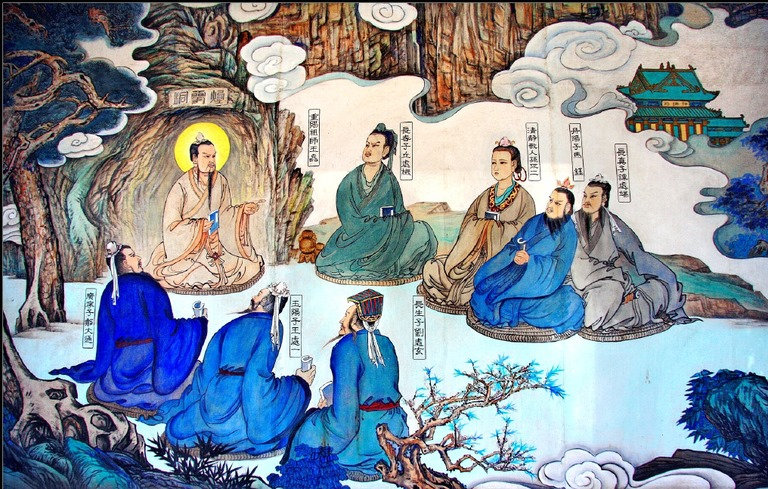bussi
Iron
- Joined
- Jan 12, 2024
- Posts
- 54
- Reputation
- 116
In certain cultures, seminal retention has been considered the key to male longevity, a sort of elixir of youth.

Sacred texts are replete with legends about extremely long-lived men, in theory thanks to the practice of seminal retention (among other things).
But is there any truth to this beyond the legend? To answer this question, we must rethink certain conceptions about aging.
We tend to think of the body as a kind of 'machine' whose components (cells) wear out and become exhausted. Aging would thus be guided by external factors (stress, toxins, lack of nutrients, etc.) up to a practical limit where some dysfunction occurs in any of the systems.
There are certain data that allow us to suspect that, perhaps, death is nothing more than an event programmed by our physiology, and that it does not really depend on the wear and tear suffered by the body.
For example, in several experiments, inserting tissue from a young animal into a mature animal made the latter rejuvenate. This process was repeated successively, and some tissues were still in good condition after ten transplants. The grafted tissue was somehow able to sense the general energetic state of the organism and adapt its activity, rejuvenating it. In fact, the opposite process has also been proven.
For reasons that in part would be resolved rather as a philosophical work, nature programs the useful life of living beings, and programs it in extreme consonance with the reproductive function. There are animals, such as the salmon or the male praying mantis, which live only male praying mantis, which live only until they reproduce. Most mammals are fertile throughout their lives, including females; and those that experience menopause do so for a period of time equivalent to the cost of caring for their offspring.

It is worth mentioning Kirkwood's 'perishable soma theory', which could explain the relationship between longevity and reproduction. According to this theory, aging (a concept inapplicable to certain forms of life, especially the most primitive) would be a biological strategy to optimize the use of resources and concentrate them on reproduction. Why allow a subject that has already left offspring and has already seen its best days to consume food that would be better spent on a younger subject that has not yet mated?
Another form of programmed obsolescence has to do with the Hayflick limit: the maximum number of divisions that each cell type can support.
Spermatozoa have half (23) of the chromosomes that the rest of the cells in the body have. In the words of Ernesto Prieto:
When the fruit fly is prevented from reproducing, it can live up to ten times longer. What happens if the process is reversed? Again, Ernesto Prieto explains:
Many indications point to the fact that certain biological signals set the pace of aging and activate the programmed obsolescence program. Without ruling out other possible causes, I would bet on prolactin, a pituitary hormone secreted after ejaculation. Prolactin inhibits sexual function, in a self-defense mechanism that, by the way, pornography and the Coolidge Effect skip over: it is famous the anecdote of the male guinea pig that, after escaping from his cage and assaulting the cage of the females, copulated with each one of them until he was exhausted and slept for 3 days.
This 'blackout' is obviously not caused by any physical wear and tear from sexual activity, as anyone who experiences sex without ejaculation will have seen.
In their handbook on theories of aging, Bengston and Schaie discuss the role of the hormone DECO, which marks the decreasing consumption of oxygen with age, and also influences the efficiency of metabolism. Prolactin is a close hormone; as the name suggests, it induces milk production in women and also acts on several male sex organs. It interferes with the production of certain steroids associated with youth, and depresses the immune system.
Another option, not incompatible with the previous ones, has to do with the SPOCD1 protein, which protects germ cells from potential errors in gene copying, allowing DNA to pass safely from generation to generation. Can this protein have additional effects in other tissues?

Sacred texts are replete with legends about extremely long-lived men, in theory thanks to the practice of seminal retention (among other things).
But is there any truth to this beyond the legend? To answer this question, we must rethink certain conceptions about aging.
We tend to think of the body as a kind of 'machine' whose components (cells) wear out and become exhausted. Aging would thus be guided by external factors (stress, toxins, lack of nutrients, etc.) up to a practical limit where some dysfunction occurs in any of the systems.
There are certain data that allow us to suspect that, perhaps, death is nothing more than an event programmed by our physiology, and that it does not really depend on the wear and tear suffered by the body.
For example, in several experiments, inserting tissue from a young animal into a mature animal made the latter rejuvenate. This process was repeated successively, and some tissues were still in good condition after ten transplants. The grafted tissue was somehow able to sense the general energetic state of the organism and adapt its activity, rejuvenating it. In fact, the opposite process has also been proven.
For reasons that in part would be resolved rather as a philosophical work, nature programs the useful life of living beings, and programs it in extreme consonance with the reproductive function. There are animals, such as the salmon or the male praying mantis, which live only male praying mantis, which live only until they reproduce. Most mammals are fertile throughout their lives, including females; and those that experience menopause do so for a period of time equivalent to the cost of caring for their offspring.

It is worth mentioning Kirkwood's 'perishable soma theory', which could explain the relationship between longevity and reproduction. According to this theory, aging (a concept inapplicable to certain forms of life, especially the most primitive) would be a biological strategy to optimize the use of resources and concentrate them on reproduction. Why allow a subject that has already left offspring and has already seen its best days to consume food that would be better spent on a younger subject that has not yet mated?
Another form of programmed obsolescence has to do with the Hayflick limit: the maximum number of divisions that each cell type can support.
Spermatozoa have half (23) of the chromosomes that the rest of the cells in the body have. In the words of Ernesto Prieto:
As far as age is concerned, whenever a new being is created, the two germ cells that make it up seem to start from scratch. Don't these cells age? Apparently not (...). This means that the happy sperm cells (...) that you possess are in fact an astonishing 120,000 years old (...). For this to happen, it is essential that the germ cell is provided with mechanisms that prevent its aging (...). Perhaps this is the explanation why it is beneficial to save sexual energy - perhaps because the secret of germ cell immortality is some kind of subtle energy that benefits the rest of the body if it is absorbed.
When the fruit fly is prevented from reproducing, it can live up to ten times longer. What happens if the process is reversed? Again, Ernesto Prieto explains:
It is amazing to observe how, as soon as they are provided with amino acids, they develop their genital apparatus rapidly and run -that is, fly- to copulate frantically... dropping dead moments later.
Many indications point to the fact that certain biological signals set the pace of aging and activate the programmed obsolescence program. Without ruling out other possible causes, I would bet on prolactin, a pituitary hormone secreted after ejaculation. Prolactin inhibits sexual function, in a self-defense mechanism that, by the way, pornography and the Coolidge Effect skip over: it is famous the anecdote of the male guinea pig that, after escaping from his cage and assaulting the cage of the females, copulated with each one of them until he was exhausted and slept for 3 days.
This 'blackout' is obviously not caused by any physical wear and tear from sexual activity, as anyone who experiences sex without ejaculation will have seen.
In their handbook on theories of aging, Bengston and Schaie discuss the role of the hormone DECO, which marks the decreasing consumption of oxygen with age, and also influences the efficiency of metabolism. Prolactin is a close hormone; as the name suggests, it induces milk production in women and also acts on several male sex organs. It interferes with the production of certain steroids associated with youth, and depresses the immune system.
it is not advisable to simplify the role of this or any other hormone, which can play very different roles in varying circumstances, depending on the individual and the tissue on which it acts.
Another option, not incompatible with the previous ones, has to do with the SPOCD1 protein, which protects germ cells from potential errors in gene copying, allowing DNA to pass safely from generation to generation. Can this protein have additional effects in other tissues?


 ️
️ 



